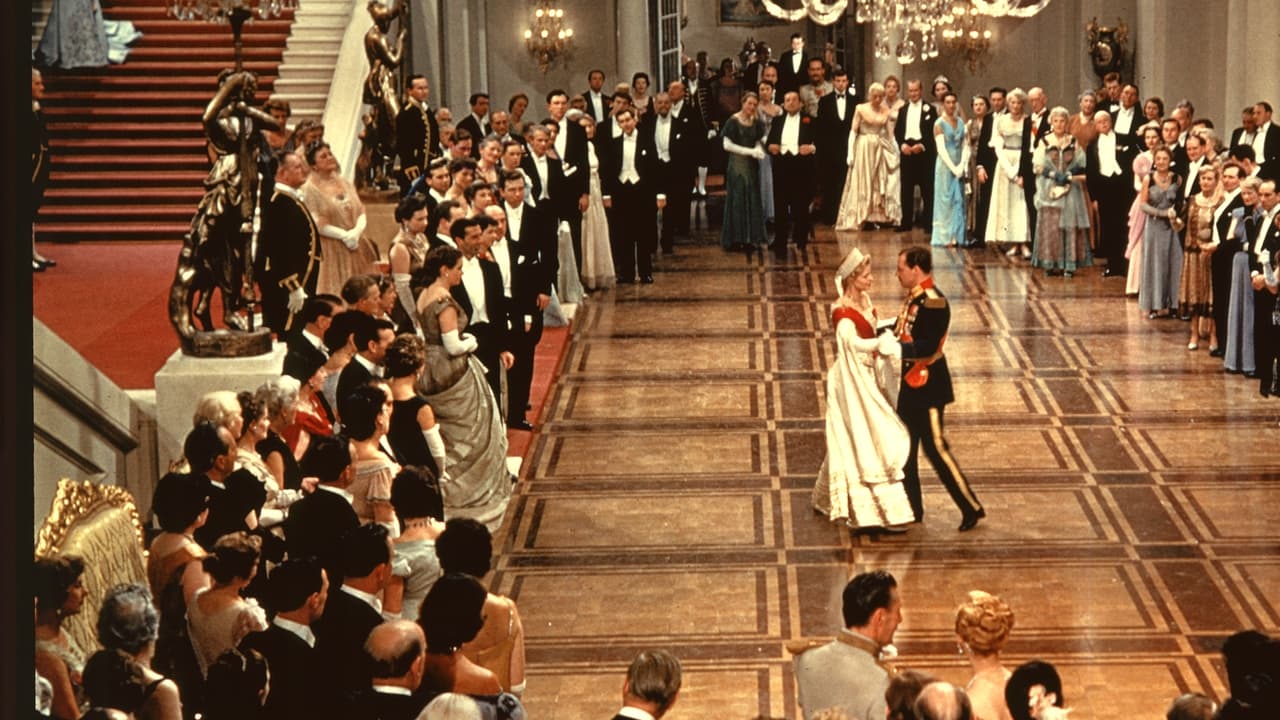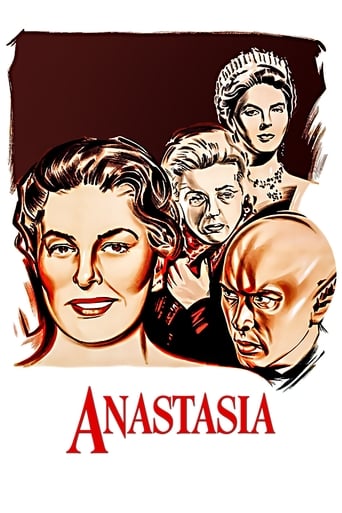



Really Surprised!
People are voting emotionally.
The movie is wonderful and true, an act of love in all its contradictions and complexity
View MoreThere are moments that feel comical, some horrific, and some downright inspiring but the tonal shifts hardly matter as the end results come to a film that's perfect for this time.
View MorePrincipal players: Ingrid Bergman (Anastasia), Yul Brynner (the prince), Helen Hayes (the dowager empress).Interesting players in supporting roles: Akim Tamiroff (Chernov), Martita Hunt (the baroness), Ivan Desny (Prince Paul). Principal production personnel: Director: Anatole Litvak. Screenplay: Arthur Laurents, based on a stage play by Guy Bolton (which was in turn based on a TV play by Marcelle Maurette). Photography: Jack Hildyard. Color: DeLuxe. Art directors: Andrei Andrejew, Bill Andrews. Music: Alfred Newman. Producer: Buddy Adler. 20th Century-Fox. 105 minutes. Official release date: 13 December 1956. New York opening at the Roxy. COMMENT: Deservedly a great commercial and critical success, "Anastasia" won numerous awards, including America's two top Best Actress citations for Ingrid Bergman and a National Board of Review "Best Actor" for Yul Brynner. The story, of course, has been heavily romanticized, but Litvak's aim was to deliver spellbinding entertainment, and this, with the support of an engrossing script, a charismatic cast and well over $3.5 million in production values, the director has admirably achieved. Rarely has the super-wide CinemaScope screen been so consistently utilized with such power and dramatic impact. In color, only "Broken Lance", "The River of No Return" and "The Virgin Queen" run "Anastasia" close. The DVD can be obtained on the 20th Century-Fox label. Quality rating: ten out of ten.
View MoreTypical Hollywood fare circa 1956 complete with a gypsy dancing sequence.Ingrid Bergman at 42 is too old for the role. She is playing 27 year old Anastasia. But everyone watched the movie to see Ingrid more than Anastasia.That is not to say the film was not entertaining, it was, although it started off slow. Also it is filmed almost entirely with stage sets which is depressing we are so spoiled these days.Why is it that a film that was made in 1956 and is supposed to take place in 1928 still looks like 1956? Something about the hairdos the way the women were trussed up even the way they walk...and finally as mentioned above the prerequisite gypsy dancing scene. You expect a Cadillac fin to be in the mix some place.A watch if you have nothing better make allowances for period Hollywood corn.
View MoreAnatole Litvak directed this drama that fictionalizes the story of presumed murdered Czarina princess Anastasia, whom three Russian exiles(led by Yul Brynner) plot to pass off as the real thing in order to get part of the vast fortune, using suicidal and destitute woman named Anastasia(played by Ingrid Bergman in an Academy Award winning role) who comes to believe she is the real czarina, though must convince the skeptical Empress(played by Helen Hayes) to be accepted. Ponderous and dated film has fine acting, but story was based on the real Anna Anderson, who made the initial claims(and was profiled on both "In Search Of..." & "Unsolved Mysteries") that have since been disproved by irrefutable DNA evidence.
View More"Anastasia" is not a film for everyone. Those who insist on historical accuracy in films depicting real people and events would do best to stay away from the movie house altogether. "Anastasia," however, is not exactly about real people, although it does incorporate the lives of real humans and parallels with their true stories to depict a compelling "what-if" scenario and this is incredibly effective, even after DNA tests have revealed that "Anna Anderson" was definitely not Anastasia Nikolavena Romanov but instead, in all likelihood a Kashubian factory worker. (I am unaware whether she ever used the name "Anna Koreff.")As a matter of fact, those who are familiar with the real story are in for an even grander treat. We are thrown into 1928 Paris with a brief shot of this wretched madwoman at Russian Easter, lonely and rejected outside the Russian Orthodox Cathedral and on the brink of suicide, and we are definitely prepared to think of see as the impostor that "Anna Anderson" was. Yet as the film progresses, we are shown a woman quite literally without any past. Michael Thornton opined of the real "Anna Anderson," "Somewhere along the way she lost and rejected (Kashubian factory worker Franziska) Schanzkowska. She lost that person totally and accepted completely she was this new person."Ingrid Bergman's Anna Koreff, however, is not simply mentally lost: the world has lost her as well. It helps, perhaps, that Bergman is infinitely more convincing as a princess than as a vagabond, and the retrospective certitude of the falsity of "Anna Anderson"'s claim helps to disguise her limits at the beginning of the film when, like Yul Brynner's General Bounine, we are meant to doubt her identity. Bounine creates Koreff's new identity as the Grand Duchess Anastasia, and so effectively that he begins to believe in it himself. But the entirely unsolvable questions remain:Is Anna Koreff Anastasia? Does she actually believe she is Anastasia? More ominously, whoever she is, does she even truly and consciously remember?This piece carefully avoids resolving these questions. On the one hand, the speed and thoroughness with which she slides into her new role is difficult to explain and impossible to deny. On the other hand, the ending (among other things) is cleverly constructed so as to expose her assumed royal identity as a construction. This is not, of course, the real story, and in the post-1900 world, such a thorough and complete break with any sort of past anchor is next to impossible. But if it happened... this may be just how it happened."Anastasia" is above all a beautifully designed film, full of elegance and taste. Ingrid Bergman is as beautiful as the interior architecture against which she assumes her royal identity. Again, it is not a film for everyone: many will have great difficulty connecting and sympathizing with the royal circles and personalities in this tome, but those who are able to understand pre-modern, pre-liberal (c.f. human) sensibilities will love it. Helen Hayes is absolutely perfect and inspiring as the Dowager Empress Maria Feodorovna (it is plain to see how the real Empress was so beloved in her adopted Russia), and her chemistry with Bergman is incredible to behold. The only thing I can find to critique is that the script--and to some extent a steely wall between Bergman and Brynner--does not fully back up the eventual culmination of the relationship between Koreff and Bounine; the conclusion fits quite well thematically but is mildly illogical with regard to the plot. Still, this is a minor complaint, as "Anastasia" is first and foremost a film about identity, and one that will jar and confound its viewers time and again.
View More